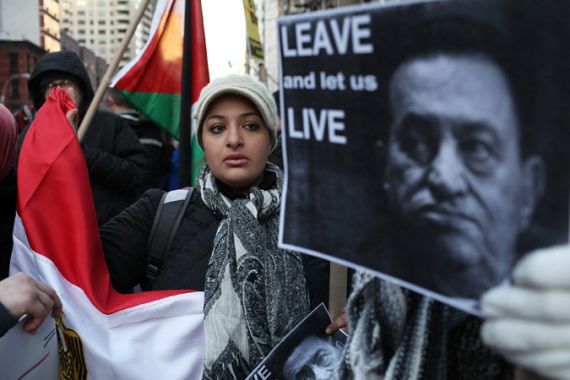Egyptian-Americans hold rallies
Standing in solidarity with those back home, people across the US organise protests against the Egyptian president.

 |
| People protested against Hosni Mubarak in New York, Washington, Chicago, Los Angeles and elsewhere in the US [AFP] |
“Down, down with Hosni Mubarak! Saudi Arabia is waiting for you!”
The rhyme and rhythm is lost in translation, but the protesters’ chants are often catchy and straight to the point. Many are identical to those being used on the streets of Egypt. Most of them are in Arabic, but some are in English.
Across the US, people have been showing their solidarity with those who have taken to the streets in Egypt to demand the ouster of their long-time president.
Americans of mostly Egyptian and Arab descent have been organising rallies and marches of their own. Some of the largest have been in Chicago and Los Angeles.
In Washington, the protests began on Friday when close to one hundred people gathered under the snow at 1600 Pennsylvania Avenue.
The following day nearly a thousand people rallied in front of the Egyptian embassy, before marching seven miles in the cold to return to the White House.
They were out again on Sunday and Monday (albeit in smaller numbers), and they plan to keep making their voices heard as long as the protests continue in Egypt.
 |
So far, the slogans in Washington have been aimed mostly at Mubarak and his associates.
However, the demonstrators also want Barack Obama’s attention. For starters, they are calling for the US president and his administration to take a clear and concrete stance on the situation in Egypt.
As Mohammad Mansour, one protester, put it, “Obama needs to be clear … either he stands with Mubarak, or he stands with the Egyptian people”.
The people on the streets of Egypt have one demand that seems non-negotiable: they want the man who has ruled unchallenged for over 30 years to step down.
In the early days of the uprising, US officials had nothing new to say in public. Mubarak’s status as an “ally” was repeatedly reaffirmed, and Hillary Clinton, US secretary of state, assured the world that the Egyptian government was “stable”.
In a televised address delivered Friday evening, Obama said: “The United States will continue to stand up for the rights of the Egyptian people and work with their government in pursuit of a future that is more just, more free, and more hopeful.”
By Sunday, Clinton was calling for an “orderly transition to a democratic regime”.
But on Monday Robert Gibbs, White House press secretary, clarified: “We’re not picking between those on the street and those in the government.”
Friends of Egypt?
As committed as the Obama administration may be to promoting freedom of expression and true democracy in Egypt, officials remain cautious in their choice of words and interviews. They do not want to jeopardise the “close partnership” between the two governments that is so highly valued in Washington.
That alliance dates back to the 1978 Camp David Accords and the subsequent peace treaty signed by Mubarak’s predecessor, Anwar Sadat, and the then Israeli prime minister, Menachem Begin.
Shortly thereafter the US began supplying Egypt with over $1.3bn in military aid every year, second only to Israel.
When Sadat was assassinated in 1981, Mubarak came to power under the banner of his predecessor’s National Democratic Party.
The country was put under a state of emergency that has lasted for the duration of Mubarak’s presidency (it has been renewed every three years, for 30 years).
Egypt’s ties to the US [and Israel] have grown stronger with time and there is concern in Washington that all could be reversed if the Mubarak government crumbles.
Many Egyptians are convinced that the US is largely responsible for keeping Mubarak in power for as far back as most of them can remember. And considering the widespread opposition to Israel among the masses, the Obama administration is justified in thinking that some things are likely to change.
But the people of Egypt are not worried about the impact their movement will have on US foreign policy, and they are not looking too far ahead just yet.
Holding firm
Recent days have seen some changes in Egypt, but the new political appointments and reforms proposed by Mubarak mean nothing to the protesters.
As one of them told Al Jazeera on Monday, “we don’t want to see Hosni Mubarak talking to us on television anymore … there are people here who are willing to die before ever seeing his face again. He has to go”.
Likewise, none of the statements from US officials have satisfied protesters in Washington and other parts of the country. They want to see Mubarak gone. They also want the US to stop supplying him with military equipment and munitions.
Many of the signs being carried in front of the White House read” “End US support for the Mubarak dictatorship!”
One bore the inscription: “Dictator made in the USA”.
Mariam Aziz held a sign up equating the $30+ billion in US military assistance to Egypt with 30 years of dictatorship. She questioned the justification for that kind of support and called on Obama to support the Egyptian people instead.
Like many of the protesters in North America, Mariam feels it is important to show solidarity with her counterparts in Egypt. She has been one of the main Facebook organisers of the daily rallies in Washington, and for whatever it’s worth, there has been a close correlation between the number of protesters who show up to those demonstrations and the confirmed attendances on the relevant Facebook pages.
Social networking sites
While it may be shortsighted to credit websites like Facebook and Twitter with driving the popular movement in Egypt, there is no question that social networking sites have played a big part in spreading those protests across the world.
Those demonstrating in front of the White House for the past several days have come from all walks of life. There have been Americans, Tunisians, Ethiopians, and others.
Still, most of the regulars are of Egyptian origin, and although they know their rallies pale in comparison to the street protests back home, they feel it is the very least they can do to show their support, which is something they do with pride.
Most of them realise that their actions will have little to no bearing on what happens in Egypt, but they want their compatriots to know that they are not alone.
Their ultimate goal is one and the same. The protesters in Washington hope to do what they can to convince the Obama administration to start standing squarely on the side of the Egyptian people, by calling for Mubarak to step down.